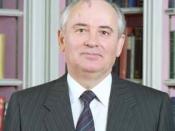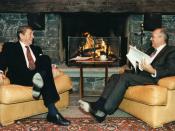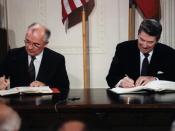Gorbachev
He was born in the agricultural region of Stavropol, Gorbachev studied law at Moscow Univ. Returning to Stavropol, he moved gradually upward in the local Communist party. In 1970, he became Stavropol party leader and was elected to the Supreme Soviet of the USSR. Regarded as a skilled technocrat and a reformer, Gorbachev joined (1978) the Communist party secretariat as agriculture secretary, and in 1980 he joined the politburo as the protege of Yuri Andropov. After Andropov's rise to party leadership, Gorbachev assumed (1983) full responsibility for the economy. Following the death of Konstantin Chernenko (Andropov's successor) in 1985, Gorbachev was appointed general secretary of the party despite being the youngest member of the politburo. He embarked on a comprehensive program of political, economic, and social liberalization under the slogans of Glasnost (openness) and Perestrioka (restructuring). The nuclear disaster at Chernobyl (1986) forced Gorbachev to allow even greater freedom of expression.
The government released political prisoners, allowed increased emigration, attacked corruption, and encouraged the critical re-examination of Soviet history. In a series of talks (1985-88), Gorbachev improved relations with U.S. President Ronald Reagan, and that was who he signed an Intermediate Nuclear Forces (INF) arms limitation treaty in 1987. By 1989 he had brought about the end of the Soviet occupation of Afghanistan and had sanctioned the end of the Communist monopoly on political power in Eastern Europe. For his contributions to reducing East-West tensions, he was awarded the 1990 Nobel Peace Prize. By 1990, however, Gorbachev's perestroika program had failed to deliver significant improvement in the economy, and the elimination of political and social control had released latent ethnic and national tensions in the Baltic States, in the constituent republics of Armenia, Georgia, Ukraine, and Moldova, and elsewhere. A newly created (1989) Congress of People's Deputies...


